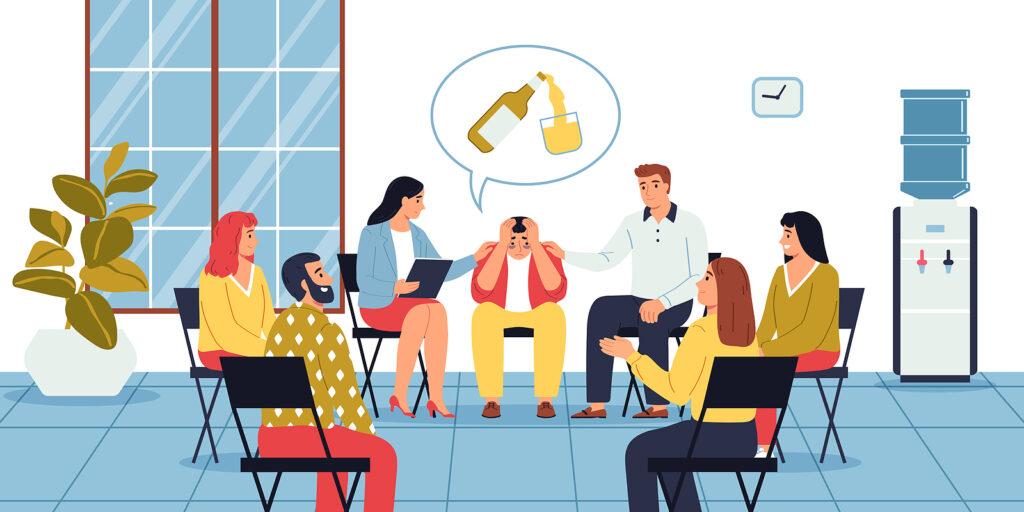Addiction Recovery Peer Support
Peer Support in Addiction Recovery: Benefits and Challenges
The path to addiction recovery can be daunting and oftentimes requires various sources of support to achieve lasting sobriety. One such source that has been proven to be effective is peer support – individuals who have experienced addiction themselves and are now able to offer support, guidance, and understanding to those in recovery. Peer support is found in self-help groups such as Alcoholics Anonymous (AA) or Smart Recovery. These are available in most communities and are typically free of charge. This blog post explores the numerous benefits and potential challenges of utilizing peer support in addiction recovery.
Tremendous Benefits of Addiction Recovery Peer Support
1. Compassionate Understanding and Empathy.
One of the primary advantages of peer support is the shared understanding and empathy between those who have gone through similar experiences. This enables individuals in recovery to relate to one another in a special way, providing a safe environment in which to express feelings and experiences without fear of judgment.
2. Positive Role Modeling and Motivation.
Witnessing the transformation and growth of a person who has encountered the same struggles can be inspiring and motivate those in recovery. This provides tangible proof that it is possible to attain and maintain a sober life, giving individuals hope for their own recovery journey.
3. Practical Guidance and Strategies.
Peers in addiction recovery have gained invaluable knowledge from their own experiences, providing insights into useful coping mechanisms, relapse prevention techniques, and lifestyle changes. This practical guidance can be immensely beneficial, supplementing formal treatment programs and providing additional resources.
4. Emotional Support and Accountability.
Recovery is not only a challenging process. But, it can be an emotionally difficult journey as well. Peers are able to provide comfort and a listening ear when times are hard, as well as act as accountability partners and hold individuals responsible for their own actions and decisions.
But Addiction Recovery Peer Support Has Significant Challenges
1. Lack of Professional Qualifications.

It is important to acknowledge that peers are not professional counselors or therapists and may not have the formal training necessary to handle complex mental health issues or provide clinical interventions. Peers need to recognize their own limitations and direct individuals to appropriate professionals when needed.
2. Establishing and Maintaining Boundaries.
In peer support relationships, it can be difficult to set boundaries between offering support and respecting personal autonomy. To address this, clear communication and interaction guidelines are essential to ensure the well-being of both parties.
3. Risk of Peer Relapse and Triggers.
Addiction recovery is an ongoing process, and even those in a peer support role may suffer a relapse or setback. This can be extremely triggering for individuals still in the early stages of recovery or struggling with their own cravings. Peers should be aware of their own triggers and have a reliable support system to prevent relapse from affecting those they are helping.
4. Limited Accessibility.
Unfortunately, peer support is not always readily available or accessible. In some areas, there may be a lack of programs or diversity in the available support groups. Those living in rural or remote areas may also face challenges in accessing peer support due to geographical restrictions.
Bottom Line on Peer Support
Peer support is an integral component of addiction recovery, offering individuals a unique set of benefits. It provides understanding, motivation, practical guidance, and emotional support that contribute to a comprehensive recovery journey. Although there may be certain challenges in peer support relationships, these can be addressed through open communication and collaboration. By doing so, we can ensure that the advantages of peer support are maximized to promote lasting sobriety.
Begin Working With An Addiction Psychiatrist in New York, NY

As an addiction psychiatrist, I would be happy to offer another source of support alongside your peers. In your journey towards addiction recovery, I’m here to provide the help you need. You can improve your mental health from my NYC, Manhattan-based practice by following these simple steps:
- Contact Stephen Gilman, MD
- Learn more about me and my approach to addiction treatment
- Start receiving the support you deserve!
Other Services Offered with Stephen Gilman, MD – Addiction Psychiatrist in NYC, Manhattan
I know that clients may experience more than one mental health concern at a time. This is why I’m happy to provide a variety of mental health services in support of addiction treatment. Services offered include treatment for alcohol addiction, young adult psychiatry, and adult psychiatry. Moreover, I provide expert guidance also happy to offer prescription drug addiction treatment, cocaine addiction, meth addiction treatment, behavioral addiction treatment, PTSD treatment, drug addiction treatment, and marijuana addiction treatment. Learn more about me or visit my blog for more helpful info.




Trackbacks & Pingbacks
[…] journey toward healing and long-term sobriety. In this blog post, we will explore effective ways to support a loved one in addiction and alcoholism recovery. By understanding their needs, providing encouragement, and […]
[…] the situation with care and compassion. By being aware of the signs of addiction and taking steps to support your loved one, you can help them to get the help they need and begin their journey to recovery. As an addiction […]
[…] are common occurrences during addiction recovery and should not be seen as personal […]
Comments are closed.